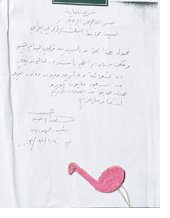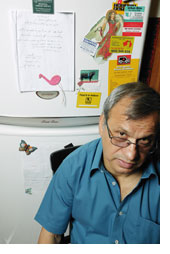
March 21, 2006

A Fridge Full of Dollars
The Americans have put the mess back into Mesopotamia, says an Iraqi economist back in Australia after trying to help in the reconstruction of his birthplace. Eric Ellis reports


Imad Moosa’s fridge door is probably the only
one in Australia with a handwritten letter from Saddam Hussein, up there with
the usual magnets, plumbers’ numbers and the kids’ busy schedules.
“Top Secret
In the Name of Allah, the Compassionate, the Merciful
His Excellency the Governor of the Central Bank of Iraq
This letter gives authorisation to Mr Qusay
Hussein [Saddam’s son] and Mr Hikmat Ibrahim [Saddam’s finance minister] to
receive the following cash amounts:
1. Nine hundred and twenty million US dollars.
2. Ninety million euros.
This is to protect this money from American aggression. Please execute promptly.
(signed) Saddam Hussein
President
March 19, 2003”
This remarkable demand was retrieved by Moosa from the ruins of Iraq’s central bank in Baghdad a few weeks after the Iraqi dictator was toppled. Written the day before George W. Bush’s “Coalition of the Willing” invaded Moosa’s birthland, Saddam’s demand makes illuminating reading these days, as the Cole inquiry asks embarrassing questions of John Howard’s government and AWB.
“I wouldn’t be surprised if there was AWB money amongst all that,” Moosa half-jokes. “I actually saw Trevor Flugge [former AWB chairman] there in the Green Zone in Baghdad, in the presidential palace the same time as me.”
The mind boggles, but what’s this letter doing on Moosa’s fridge? And who is Moosa anyway, other than a 53-year-old father-of-two enjoying a typical Australian family life in Melbourne’s nondescript northern suburbs?
That’s a question Canberra’s mandarins would’ve been unable to answer as they prepared their flawed case for war three years ago. A professor in economics at La Trobe University, and Australian citizen since 1994, Moosa is one of the world’s foremost experts on the Iraqi economy. The first time Australian authorities knew they had such a unique asset in their midst was when Washington asked Canberra to pay his passage to Baghdad to help them fix the economy they and Saddam had destroyed.
Moosa was in his office at La Trobe’s Department of Economics and Finance in April 2003 when his phone rang. He had been watching developments in an Iraq he left 30 years earlier and was half-expecting the call from his old friend and colleague, Stanford University professor John Taylor, with whom he’d authored two seminal economics texts.
Taylor was then US Under Secretary of the Treasury, with responsibility for international affairs. That meant pacifying Iraq. “The receptionist said ‘the Under Secretary of Treasury wants to speak to you’,” remembers Moosa. “I said to her ‘Why not?’ John came on the line and he said, ‘Imad, we want you urgently’.
“I was the biggest supporter of the invasion. That is why I had no hesitation, I was prepared to do anything to help, no question.”
A week later, Moosa was in Washington for briefings with the Treasury, the Pentagon and the office of the then National Security Adviser, Condoleezza Rice. Then he flew to Iraq. A non-practising Sunni from the mostly Shia southern city of Basra, Moosa hadn’t seen his family or Iraq for 30 years.
“Coming back was amazing. I had a mixture of emotions, happy to be there but sad to see the destruction of the place, the bombing, the degradation of the environment. I could cry just looking at the people on the street. Saddam had destroyed people. Pollution was everywhere, there were no fish in the river. It didn’t feel dangerous – that came later.”
Moosa was given the status of ambassador with the US occupation authority, a job which authorised him to escort $US8m ($11m) in cash around the country to pay wages and sift through the ruins of a central bank shorn of cash, where he chanced upon the Saddam demand. But he soon realised there were “mistakes” in the US effort “right from the beginning”.
“They were discussing privatisation and things like that. There had been a war, there was an economy to stabilise. This wasn’t the time for these discussions – that was for later. I told them you cannot convert a regulated Iraq overnight into a model market economy.
“All these bright and supposedly educated people from the IMF, they were talking floating exchange rates. I said, come on, this country hasn’t seen a dealing room, they needed stability at first so put them in a straitjacket ... what you are saying is fine down the track after stability has been restored, but not in a post-war environment.”
Moosa advised draconian measures to stabilise the economy, starting with a strict peg of the dinar to the dollar, backed by the billions in aid and oil revenues.
“I put a strong case but they decided to go with the view of the IMF.” His advice had been largely ignored by people who “knew very little of Iraq”. He met Washington’s Iraq administrator Paul Bremer three times, a man Moosa says made too many decisions based on flawed advice. “It’s clear that they [the Americans] had no plan – that was the mistake and now you have people without jobs, with guns and who are angry.”
Many Iraqis remember a golden economic age when there were three US dollars to the Iraqi dinar, before Saddam’s mismanagment wrought decades of hyperinflation. Today it takes 1470 of the dinars Washington introduced to buy one US dollar, admittedly better than the 5000 at Saddam’s worst. Moosa advised a new currency valued at four to the dollar, the pre-Kuwait invasion level. Bremer’s hapless administration overhauled the dinar in October 2003 – even introducing a 25,000 dinar note – where the most cogent feature was the symbolic absence of Saddam’s image from the notes. “Is it monetary reform simply to take Saddam’s picture off the money? Why remind people every day of Saddam’s hyperinflation? They had the chance to start afresh, but they didn’t take it.”
Moosa is sickened at the waste and corruption of Iraq’s administration in the three years since Saddam fell. “The country is no longer under sanctions; the price of oil is $US70 a barrel, you do your calculations on the basis of two million barrels of oil a day ... where is the money? Not a single power station has been erected, nothing at all, and at the same time some of the ex-ministers after Saddam, they live abroad, in fine style, they are billionaires.”
He draws the parallel between the post-Kuwait invasion – when Saddam rebuilt much of the country’s US-bombed infrastructure within two years – and today, three years after the invasion. After around $100bn in aid has poured into the country, he says, “How come nothing has been done? I don’t understand the American attitude. They came with all these fighting men and have spent $100bn and yet they have handed the country to Iran on a silver platter”.
“I’m a pragmatist and an optimist about Iraq, but about nine months ago I changed my mind about the American action. Things in Iraq were less bad under Saddam. Not better. Less bad.”
Indeed, Moosa portrays a Balkanised Iraq – “Iran West” – that’s becoming increasing “Talibanised” by religious extremists. “In Basra, the mullahs have closed down bars, nightclubs, liquor stores, cinemas, music shops. Iraq has been transformed from a secular country to a sectarian province run by Iranian-appointed mullahs. Surely they must have known this would happen?”
As we take a sunny stroll through the leafy La Trobe campus, Moosa reflects on a remarkable life journey while confronted by the usual symbols of university life. Flyers demand ‘Troops Out Of Iraq” and advertise a discussion about “The Relevance of Marx in the 21st Century”, vying for attention with an invitation to mark John Howard’s decade in office, followed by training with the university’s footy club, The Trobers.
It’s a long way from Moosa’s school life. In the late 1960s, he was in high school in Basra. His father was a Sunni, his mother a Shia – “but this stuff didn’t matter to anyone then”. In January 1969 came a defining moment. Less than a year after the coup which brought Saddam’s Baathists to power, the new regime hanged a dozen so-called spies, accusing them of spying for Israel. “They hanged three in Basra in public – they took us out of school to go and cheer. It was a show trial. They put them on the TV and got them to say this and that – it was Saddam trying to show he was a tough guy, it was all bullshit.” (By way of contrast, a week after The Bulletin met with Moosa in Melbourne, the US-backed administration in Baghdad hanged 13 Iraqis it claimed were insurgents.)
Moosa’s father was managing a dairy products factory, working for one of Basra’s more prominent families who, Saddam believed, were an alternative power centre. One of its members was executed as a spy. The business was badly affected and Moosa’s father lost his job, “guilty by association with someone who wasn’t guilty”. High school students like Moosa were being conscripted. He knew he had to get out. “I had a big mouth; I knew that would eventually get me or my family into trouble.”
He managed to get to Britain to study. The government wanted him to come back, to conscript him. He refused and his passport was cancelled. He stayed in Britain, completing a masters in economics at Sheffield University on a scholarship. Baghdad responded by declaring illegal any student who accepted scholarships from abroad without Baghdad’s approval, offenders punishable by a mandatory 15-year prison term. In 1976, he applied to return to Iraq and see his family, and was issued with a single-entry permit. Iraq was a very different place to the country he left. Baathification had taken hold. “As soon as I arrived at the airport, I could feel it, the oppressive air. I felt sick.”
His father knew someone who knew someone, and in mid-1977 he was smuggled across the Iraqi border into Kuwait. Moosa got a job as a financial analyst there, later joining an investment bank, which took him to an Australia he immediately fell in love with.
His family were not so fortunate. A younger brother, Majid, survived eight years on the Iran front during the 1980-88 war, only to be called up again in 1990 when Saddam’s forces rolled into Kuwait. After US liberators ousted the invaders, he returned home by walking the 130km back to Basra. A second brother, Ayad, was a marine technician working around the world who was picked up by Saddam’s goons after arriving home in 1988, and sent to the Iran front. “A week later they brought back his body,” Moosa says.
His family is still far from safe. “Because of my work for the coalition authority my siblings have been living in danger. My sister Lawahid, who now works for the British Consulate in Basra, has been receiving death threats. She is likely to leave the job and even the country. My brothers Majid and Ali were the target of a car bomb some two months ago. The car was parked outside their computer equipment office in Basra. They survived by a miracle, but two customers died. The fact that they are part of the Sunni minority in Basra, who are subject to ethnic cleansing, does not help.
“There are many things Australians don’t know about,” he says. “That’s probably not a bad thing sometimes.”